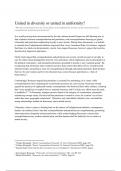United in diversity or united in uniformity?
“What did cosmopolitanism mean for various thinkers in the Enlightenment and what was the relationship between
cosmopolitanism and patriotism in that period?”
In a world growing more interconnected by the day, nations around Europe are still debating how to
find a balance between cosmopolitanism and patriotism, with cosmopolitanism focusing on global
citizenship and patriotism emphasising loyalty to one's nation. During these discussions, it is helpful
to consider how Enlightenment thinkers expressed their views: Immanuel Kant, for instance, suggests
that these two ideals can harmoniously coexist. Jean-Jaques Rousseau, however, argues that societies
should solely depend on patriotism.
Firstly, Kant argued that cosmopolitanism and patriotism can coexist, as both are part of our duty to
care for others. Kant distinguishes between civic patriotism, which emphasizes active participation in
the political community1, and nationalist patriotism, grounded in loyalty to one’s national group2. By
recognizing that all humans share common ancestry, Kant asserts that duties of love extend beyond
national borders, promoting a sense of cosmopolitanism through nationalist patriotism. Kant declares
that love for one's nation and love for all people may coexist because patriotism is a ‘duty of
benevolence’3.
Contrastingly, Rousseau argued that patriotism is essential for stimulating civic virtue, while
cosmopolitanism risks weakening the social bonds necessary for a just society. Rousseau warned
against the practices of eighteenth-century cosmopolitans who borrowed from other cultures, claiming
that “every people has or ought to have a national character, and if it lacks one, efforts must be made
to establish it4.” To Rousseau, strangers posed a threat to the integrity of communities, potentially
introducing corrupt values. He believed that patriotism is rooted in a love for a nation’s set of laws
rather than mere geographic attachment5. Therefore, only individuals, linked by law, can build the
strong relationships needed for democracy and a united society.
Ultimately, when it comes to looking back on the stances of Enlightenment thinkers, contemporary
leaders can embrace Kant’s idea that cosmopolitanism and patriotism are complementary, promoting
interconnectivity alongside national patriotism, while acknowledging Rousseau's concern that
cosmopolitanism may weaken national unity and that humans shall be linked by law to achieve a
united society.
1
Pauline Kleingeld. “Kant’s Cosmopolitan Patriotism” B. Civic Patriotism (2003): page 303.
2
Pauline Kleingeld. “Kant’s Cosmopolitan Patriotism” B. National Patriotism (2003): page 304.
3
Samuel Kahn.“Kant and the duty to promote one’s own happiness” Introduction (2018): page 2.
4
Jean-Jacques Rousseau. “Project for a Corsican Constitution.” OC, vol. III, 913.
5
Helena Rosenblatt. “Rousseau, the anticosmopolitan?” (2008): Page 64.




